We wouldn’t dream of abandoning our vast semi–annual Most Anticipated Book Previews, but we thought a monthly reminder would be helpful (and give us a chance to note titles we missed the first time around). Here’s what we’re looking out for this month. Let us know what you’re looking forward to in the comments!
Want to know about the books you might have missed? Then go read our most recent book preview. Want to help The Millions keep churning out great books coverage? Then sign up to be a member today.
The Night Watchman by Louise Erdrich: Celebrated novelist Erdrich, author of Love Medicine, The Plague of Doves, and The Round House, returns to the Chippewa Turtle Mountain Reservation in The Night Watchman. One of the most powerful voices in contemporary Native-American literature, Erdrich provides a fictionalization of her own uncle’s story, when he journeyed from North Dakota to Washington D..C in 1953 to testify on a congressional hearing about the Termination Act, which would once again abrogate the United States’ treaties with a Native-American nation. The Night Watchmen, as with all of Erdrich’s writing, reminds us that Native-American culture is not hidden in history books and museums, but an identity that is current, or as she writes in The Plague of Doves, “History works itself out in the living.” (Ed S.)
 The Glass Hotel by Emily St. John Mandel: The Millions’ own Mandel is back with The Glass Hotel, the long-awaited sequel to her much-beloved first novel, Station Eleven, a National Book Award finalist. Where Station Eleven explored a post-apocalyptic landscape ravaged by a super-plague, The Glass Hotel explores what Mandel calls “the kingdom of money”— locales as disparate as a South Carolina prison and a container ship in international waters—and the messily intertwined lives of half-siblings Vincent and Paul. In a starred review of The Glass Hotel, Publishers Weekly says, “This ingenious, enthralling novel probes the tenuous yet unbreakable bonds between people and the lasting effects of momentary carelessness.” (Adam P.)
The Glass Hotel by Emily St. John Mandel: The Millions’ own Mandel is back with The Glass Hotel, the long-awaited sequel to her much-beloved first novel, Station Eleven, a National Book Award finalist. Where Station Eleven explored a post-apocalyptic landscape ravaged by a super-plague, The Glass Hotel explores what Mandel calls “the kingdom of money”— locales as disparate as a South Carolina prison and a container ship in international waters—and the messily intertwined lives of half-siblings Vincent and Paul. In a starred review of The Glass Hotel, Publishers Weekly says, “This ingenious, enthralling novel probes the tenuous yet unbreakable bonds between people and the lasting effects of momentary carelessness.” (Adam P.)
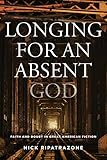 Longing for an Absent God: Faith and Doubt in Great American Fiction by Nick Ripatrazone: The Millions’ own Ripatrazone has proven himself over the past decade to be one of our most adept critics at explicating the faith of poetry and the poetics of faith. Now in Longing for an Absent God: Faith and Doubt in Great American Fiction, Ripatrazone asks in what sense Roman Catholicism informs the writings of some of our most crucial writers, from Flannery O’Connor and Walker Percy to more surprising authors like Toni Morrison (who converted) and Cormac McCarthy. For Ripatrazone, there is a fruitful tension between those who joined the Church, those who left it, and those who stayed. “Writers long for God,” Ripatrazone argues, “and their longing creates a beautiful and melancholy story.” (Ed S.)
Longing for an Absent God: Faith and Doubt in Great American Fiction by Nick Ripatrazone: The Millions’ own Ripatrazone has proven himself over the past decade to be one of our most adept critics at explicating the faith of poetry and the poetics of faith. Now in Longing for an Absent God: Faith and Doubt in Great American Fiction, Ripatrazone asks in what sense Roman Catholicism informs the writings of some of our most crucial writers, from Flannery O’Connor and Walker Percy to more surprising authors like Toni Morrison (who converted) and Cormac McCarthy. For Ripatrazone, there is a fruitful tension between those who joined the Church, those who left it, and those who stayed. “Writers long for God,” Ripatrazone argues, “and their longing creates a beautiful and melancholy story.” (Ed S.)
 Lakewood by Megan Giddings: After Lena Johnson’s grandmother dies and her family falls on hard times, she drops out of college and applies to participate in a secretive research project. The pay is good, there’s health insurance, but something’s off. Lena, a black millennial, joins a pool of subjects who are all black, Indian, or Latinx; all the researchers are white. Experimental eye drops change brown eyes blue, subjects are given mysterious medication, and it soon becomes clear that Lena’s participation may require more sacrifices than she’s willing to make. Giddings’s debut novel, Lakewood takes a long and horrified look at the costs levied on people of color in the name of science. (Kaulie)
Lakewood by Megan Giddings: After Lena Johnson’s grandmother dies and her family falls on hard times, she drops out of college and applies to participate in a secretive research project. The pay is good, there’s health insurance, but something’s off. Lena, a black millennial, joins a pool of subjects who are all black, Indian, or Latinx; all the researchers are white. Experimental eye drops change brown eyes blue, subjects are given mysterious medication, and it soon becomes clear that Lena’s participation may require more sacrifices than she’s willing to make. Giddings’s debut novel, Lakewood takes a long and horrified look at the costs levied on people of color in the name of science. (Kaulie)
 It’s Not All Downhill from Here by Terry McMillan: As its uplifting title implies, McMillan’s new novel is about women of a certain age refusing to see the late stage of life as a dreary slide toward death. At the center of a reunited group of high school classmates is 68-year-old Loretha Curry, head of a beauty-supply empire, whose world is turned upside down by an unexpected loss. “It’s about living in the here and now,” 68-year-old McMillan tells O magazine, “even being willing to fall in love and live happily ever after in these late chapters of our lives.” Like McMillan’s earlier hits, How Stella Got Her Groove Back and Waiting to Exhale, this novel looks destined for the bestseller lists. (Bill)
It’s Not All Downhill from Here by Terry McMillan: As its uplifting title implies, McMillan’s new novel is about women of a certain age refusing to see the late stage of life as a dreary slide toward death. At the center of a reunited group of high school classmates is 68-year-old Loretha Curry, head of a beauty-supply empire, whose world is turned upside down by an unexpected loss. “It’s about living in the here and now,” 68-year-old McMillan tells O magazine, “even being willing to fall in love and live happily ever after in these late chapters of our lives.” Like McMillan’s earlier hits, How Stella Got Her Groove Back and Waiting to Exhale, this novel looks destined for the bestseller lists. (Bill)
 My Dark Vanessa by Kate Elizabeth Russell: At 15, Vanessa Wye enters into an affair with Jacob Strane, her 42-year-old English teacher. Seventeen years later, Vanessa must reckon with their relationship when Jacob is accused of sexually abusing another student. Author Janet Fitch says: “It’s breathtakingly suspenseful, like downing a flaming drink without blowing it out.” Compulsive, complicated, and timely, Russell’s debut explores ideas of memory, trauma, abuse, and complicity. (Carolyn)
My Dark Vanessa by Kate Elizabeth Russell: At 15, Vanessa Wye enters into an affair with Jacob Strane, her 42-year-old English teacher. Seventeen years later, Vanessa must reckon with their relationship when Jacob is accused of sexually abusing another student. Author Janet Fitch says: “It’s breathtakingly suspenseful, like downing a flaming drink without blowing it out.” Compulsive, complicated, and timely, Russell’s debut explores ideas of memory, trauma, abuse, and complicity. (Carolyn)
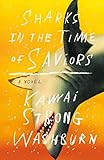 Sharks in the Time of Saviors by Kawai Strong Washburn: The author was born and raised on the Hamakua coast of the Big Island and this is the novel that will help many of us realize we need to read more fiction from Hawai’i. In 1995, seven-year-old Nainoa Flores falls over the side of a cruise ship, but is rescued by a shark—a divine favor. When fortunes turn, his family is forced to confront their bonds, the meaning of heritage, and the cost of survival. Marlon James calls it, “a ferocious debut.” (Claire)
Sharks in the Time of Saviors by Kawai Strong Washburn: The author was born and raised on the Hamakua coast of the Big Island and this is the novel that will help many of us realize we need to read more fiction from Hawai’i. In 1995, seven-year-old Nainoa Flores falls over the side of a cruise ship, but is rescued by a shark—a divine favor. When fortunes turn, his family is forced to confront their bonds, the meaning of heritage, and the cost of survival. Marlon James calls it, “a ferocious debut.” (Claire)
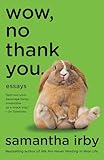 Wow, No Thank You by Samantha Irby: A collection of essays on life, love, and work by the piercingly funny and trenchant writer, to follow the bestselling We Are Never Meeting in Real Life. The new collection documents bad dates with new friends, weeks in Los Angeles taking meetings with “tv executives slash amateur astrologers,” while being a “cheese fry-eating slightly damp Midwest person,” “with neck pain and no cartilage in [her] knees,” who still hides past due bills under her pillow. Read Irby’s latest piece on settling down, for The Cut. (Lydia)
Wow, No Thank You by Samantha Irby: A collection of essays on life, love, and work by the piercingly funny and trenchant writer, to follow the bestselling We Are Never Meeting in Real Life. The new collection documents bad dates with new friends, weeks in Los Angeles taking meetings with “tv executives slash amateur astrologers,” while being a “cheese fry-eating slightly damp Midwest person,” “with neck pain and no cartilage in [her] knees,” who still hides past due bills under her pillow. Read Irby’s latest piece on settling down, for The Cut. (Lydia)
 August by Callan Wink: The author’s debut novel follows his 2016 short story collection, Dog, Run, Moon—a set so good that I hoped Wink could distract himself from fly-fishing long enough to range further and give us a novel. And now he has: this testament to the obstacles encountered by a Michigan boy battling his way toward manhood. Told with all the economy, clarity of character, and lively prose that mark Wink’s short stories, this is writing that would tell just as well around the campfire as it does on the page. (Il’ja)
August by Callan Wink: The author’s debut novel follows his 2016 short story collection, Dog, Run, Moon—a set so good that I hoped Wink could distract himself from fly-fishing long enough to range further and give us a novel. And now he has: this testament to the obstacles encountered by a Michigan boy battling his way toward manhood. Told with all the economy, clarity of character, and lively prose that mark Wink’s short stories, this is writing that would tell just as well around the campfire as it does on the page. (Il’ja)
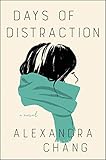 Days of Distraction by Alexandra Chang: In what Nana Kwame Adjei-Brenyah has described as an “immaculate debut novel” and “a wholly engaging joy to read,” Chang follows a 24-year-old Asian-American woman as she leaves a prestigious tech reporting job in Silicon Valley to move with her boyfriend to upstate New York. The move, precipitated by her boyfriend’s entrance into graduate school, is more of an excuse than a reason. The narrator has been searching for a way out. But once there, she finds herself captivated by stories of Asian Americans in history, and forced to think more deeply than she ever has about her role in an interracial relationship. In this tender, funny, coming-of-adulthood story, Chang asks what it means to live in a society that does not notice or understand you. (Jacqueline)
Days of Distraction by Alexandra Chang: In what Nana Kwame Adjei-Brenyah has described as an “immaculate debut novel” and “a wholly engaging joy to read,” Chang follows a 24-year-old Asian-American woman as she leaves a prestigious tech reporting job in Silicon Valley to move with her boyfriend to upstate New York. The move, precipitated by her boyfriend’s entrance into graduate school, is more of an excuse than a reason. The narrator has been searching for a way out. But once there, she finds herself captivated by stories of Asian Americans in history, and forced to think more deeply than she ever has about her role in an interracial relationship. In this tender, funny, coming-of-adulthood story, Chang asks what it means to live in a society that does not notice or understand you. (Jacqueline)
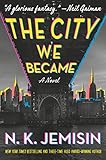 The City We Became by N.K. Jemisin: In a starred review, Kirkus called the latest novel from science fiction luminary Jemisin “fierce, poetic, uncompromising.” Set in Jemisin’s hometown of New York City, this work of speculative fiction features five New Yorkers who must come together to defend their city against the Enemy, which Jemisin described, in an interview with EW, as “a dangerous otherworldly tourist…trying to supernaturally gentrify the city to death.” Toilet stalls attack, backyard pools become portals, and FDR traffic “becomes a literal, tentacled killer.” So, your standard work of social realism. I can’t wait for this one. (Jacqueline)
The City We Became by N.K. Jemisin: In a starred review, Kirkus called the latest novel from science fiction luminary Jemisin “fierce, poetic, uncompromising.” Set in Jemisin’s hometown of New York City, this work of speculative fiction features five New Yorkers who must come together to defend their city against the Enemy, which Jemisin described, in an interview with EW, as “a dangerous otherworldly tourist…trying to supernaturally gentrify the city to death.” Toilet stalls attack, backyard pools become portals, and FDR traffic “becomes a literal, tentacled killer.” So, your standard work of social realism. I can’t wait for this one. (Jacqueline)
 Sansei and Sensibility by Karen Tei Yamashita: Yamashita blends Jane Austen’s characters with stories of Japanese Americans in this dynamic collection. In merging these characters, she reconsiders canonical works, questions cultural inheritance, and experiments with genre and form. Julie Otsuka says “whether she is riffing on Jane Austen, channeling Jorge Luis Borges, or meditating on Marie Kondo, Yamashita is a brilliant and often subversive storyteller in superb command of her craft.” (Zoë)
Sansei and Sensibility by Karen Tei Yamashita: Yamashita blends Jane Austen’s characters with stories of Japanese Americans in this dynamic collection. In merging these characters, she reconsiders canonical works, questions cultural inheritance, and experiments with genre and form. Julie Otsuka says “whether she is riffing on Jane Austen, channeling Jorge Luis Borges, or meditating on Marie Kondo, Yamashita is a brilliant and often subversive storyteller in superb command of her craft.” (Zoë)
 Writers & Lovers by Lily King: Following up on the success of her novel Euphoria, King’s latest follows a Casey Peabody, a 31-year-old waitress who is mourning the sudden loss of her mother and her most recent relationship. While she aches to live the creative life she’s always dreamed of, she spends her days writing her novel, working a dead-end job, and having not one—but two—affairs. Author Madeline Miller calls the novel “captivating, potent, incisive, and wise” and “a moving story of grief, and recovering from grief, and of a young woman finding her courage for life.” (Carolyn)
Writers & Lovers by Lily King: Following up on the success of her novel Euphoria, King’s latest follows a Casey Peabody, a 31-year-old waitress who is mourning the sudden loss of her mother and her most recent relationship. While she aches to live the creative life she’s always dreamed of, she spends her days writing her novel, working a dead-end job, and having not one—but two—affairs. Author Madeline Miller calls the novel “captivating, potent, incisive, and wise” and “a moving story of grief, and recovering from grief, and of a young woman finding her courage for life.” (Carolyn)
 First, Catch by Thom Eagle: Winner of the Debut Food Book at the Fortnum and Mason’s Awards, Eagle’s collection is less a step-by-step cookbook than meandering musings on the emotional, philosophical, and physical journey of creating a large spring lunch. In his preface, he writes that he wanted this book “to demonstrate to my own satisfaction that there is so much more to food than just the cooking of it.” Publishers Weekly’s starred review says, “This wonderfully indulgent, pleasurable compilation of culinary meditations will thrill food lovers.” (Carolyn)
First, Catch by Thom Eagle: Winner of the Debut Food Book at the Fortnum and Mason’s Awards, Eagle’s collection is less a step-by-step cookbook than meandering musings on the emotional, philosophical, and physical journey of creating a large spring lunch. In his preface, he writes that he wanted this book “to demonstrate to my own satisfaction that there is so much more to food than just the cooking of it.” Publishers Weekly’s starred review says, “This wonderfully indulgent, pleasurable compilation of culinary meditations will thrill food lovers.” (Carolyn)
 The Companions by Katie M. Flynn: After a pandemic wipes out huge portions of the population, the quarantined are kept company by Companions, which are factory-created humanoids that the dead upload their consciousness into. When Lilac, one of the first Companions, realizes she can defy her programming, she sets off in search of the person who murdered her as a teenager—and begins to meet the richly-drawn characters of Flynn’s slightly-futuristic world. Told through eight different points of view over two decades, Flynn’s speculative debut novel poses questions about memory, identity, and humanity. (Carolyn)
The Companions by Katie M. Flynn: After a pandemic wipes out huge portions of the population, the quarantined are kept company by Companions, which are factory-created humanoids that the dead upload their consciousness into. When Lilac, one of the first Companions, realizes she can defy her programming, she sets off in search of the person who murdered her as a teenager—and begins to meet the richly-drawn characters of Flynn’s slightly-futuristic world. Told through eight different points of view over two decades, Flynn’s speculative debut novel poses questions about memory, identity, and humanity. (Carolyn)
 Spirit Run by Noé Álvarez: Born to Mexican immigrant parents in Yakima, Álvarez finds himself working at a fruit warehouse while dreaming of escaping Washington. In his debut memoir, he chronicles his journey to freedom via the Peace and Dignity Journeys, which are epic, 6,000-mile marathons across North America organized by Native American activists. A starred review in Publishers Weekly called the “spellbinding” novel a “literary tour de force beautifully combines outdoor adventure with a sharp take on immigration.” (Carolyn)
Spirit Run by Noé Álvarez: Born to Mexican immigrant parents in Yakima, Álvarez finds himself working at a fruit warehouse while dreaming of escaping Washington. In his debut memoir, he chronicles his journey to freedom via the Peace and Dignity Journeys, which are epic, 6,000-mile marathons across North America organized by Native American activists. A starred review in Publishers Weekly called the “spellbinding” novel a “literary tour de force beautifully combines outdoor adventure with a sharp take on immigration.” (Carolyn)
 Everyone on the Moon Is Essential Personnel by Julian K. Jarboe: Jarboe’s 16-story collection—which contains everything from novellas to two-page stories bordering on prose poems—mixes fabulism, sci-fi, and surrealism. Their debut is a literary bricolage exploring queerness, body horror, alienation, and belonging. “Throughout, Jarboe melds tenderness, humor, and righteous anger into insightful tales of characters navigating the margins of society,” says Publishers Weekly’s starred review. (Carolyn)
Everyone on the Moon Is Essential Personnel by Julian K. Jarboe: Jarboe’s 16-story collection—which contains everything from novellas to two-page stories bordering on prose poems—mixes fabulism, sci-fi, and surrealism. Their debut is a literary bricolage exploring queerness, body horror, alienation, and belonging. “Throughout, Jarboe melds tenderness, humor, and righteous anger into insightful tales of characters navigating the margins of society,” says Publishers Weekly’s starred review. (Carolyn)
 The Mountains Sing by Nguyễn Phan Quế Mai: Celebrated Vietnamese poet and author Quế Mai’s first novel translated into English is a multigenerational epic about the Tran family. Set in 20th-century Vietnam, the novel explores how one family navigates war, loss, and trauma, but also how they remain buoyed by hope and each other. In a starred review, Publishers Weekly called the “lyrical, sweeping debut” a “brilliant, unsparing love letter to Vietnam will move readers.” (Carolyn)
The Mountains Sing by Nguyễn Phan Quế Mai: Celebrated Vietnamese poet and author Quế Mai’s first novel translated into English is a multigenerational epic about the Tran family. Set in 20th-century Vietnam, the novel explores how one family navigates war, loss, and trauma, but also how they remain buoyed by hope and each other. In a starred review, Publishers Weekly called the “lyrical, sweeping debut” a “brilliant, unsparing love letter to Vietnam will move readers.” (Carolyn)
 The Exhibition of Persephone Q by Jessi Jezewska Stevens: In the weeks after 9/11, freelancer Percy discovers she is pregnant and also discovers she cannot tell anyone about it, including her husband. Amid the changes, internally and externally, Percy receives a package containing a catalog for a photography show. Even more strangely, the woman in the photos looks like Percy—or does she? What comes next is an exploration of self, identity, and reality in the digital age. Catherine Lacey writes, “With a voice both riveting and wisely bizarre, Jessi Jezewska Stevens tells a timeless story of the battle to stop the present from turning into the past.”(Carolyn)
The Exhibition of Persephone Q by Jessi Jezewska Stevens: In the weeks after 9/11, freelancer Percy discovers she is pregnant and also discovers she cannot tell anyone about it, including her husband. Amid the changes, internally and externally, Percy receives a package containing a catalog for a photography show. Even more strangely, the woman in the photos looks like Percy—or does she? What comes next is an exploration of self, identity, and reality in the digital age. Catherine Lacey writes, “With a voice both riveting and wisely bizarre, Jessi Jezewska Stevens tells a timeless story of the battle to stop the present from turning into the past.”(Carolyn)
 Marguerite by Marina Kemp: In Kemp’s debut, young nurse Marguerite Demers moves to a small farm in the South of France to care for Jérôme Lanvier—a cruel and once-powerful man who is now on his deathbed. Swirling gossip, jealousy, and secrets threaten to destroy the small town and its inhabitants including Marguerite. The novel has received starred reviews from both Kirkus and Publishers Weekly, which raved, “Stellar…Expect Kemp to make a big splash.” (Carolyn)
Marguerite by Marina Kemp: In Kemp’s debut, young nurse Marguerite Demers moves to a small farm in the South of France to care for Jérôme Lanvier—a cruel and once-powerful man who is now on his deathbed. Swirling gossip, jealousy, and secrets threaten to destroy the small town and its inhabitants including Marguerite. The novel has received starred reviews from both Kirkus and Publishers Weekly, which raved, “Stellar…Expect Kemp to make a big splash.” (Carolyn)
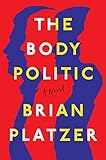 The Body Politic by Brian Platzer: Platzer’s sophomore novel (following Bed-Stuy Is Burning) follows four New Yorkers dealing with infidelity, loss, chronic illness, and betrayal in the aftermath of the 2016 presidential election. Brought together in the unstable years after 9/11, the four friends find themselves—and their lives—in free fall again. Jenny Offill calls the novel, “A cleverly constructed and emotionally compelling novel about the common disappointments and surprising consolations of middle age.” (Carolyn)
The Body Politic by Brian Platzer: Platzer’s sophomore novel (following Bed-Stuy Is Burning) follows four New Yorkers dealing with infidelity, loss, chronic illness, and betrayal in the aftermath of the 2016 presidential election. Brought together in the unstable years after 9/11, the four friends find themselves—and their lives—in free fall again. Jenny Offill calls the novel, “A cleverly constructed and emotionally compelling novel about the common disappointments and surprising consolations of middle age.” (Carolyn)
 Temporary by Hilary Leichter: Leichter’s absurdist debut follows a nameless woman with 23 temporary jobs (including working for a murderer and working on a pirate ship), 18 casual boyfriends, and a ghost who lends her life advice as she searches for “the steadiness,” or a permanent position. (And aren’t we all?) Publishers Weekly’s starred review says the “cutting, hilarious critique of the American dream will appeal to fans of Italo Calvino.” (Carolyn)
Temporary by Hilary Leichter: Leichter’s absurdist debut follows a nameless woman with 23 temporary jobs (including working for a murderer and working on a pirate ship), 18 casual boyfriends, and a ghost who lends her life advice as she searches for “the steadiness,” or a permanent position. (And aren’t we all?) Publishers Weekly’s starred review says the “cutting, hilarious critique of the American dream will appeal to fans of Italo Calvino.” (Carolyn)
 Recollections of My Nonexistence by Rebecca Solnit: The prolific cultural critic and author of Men Explain Things to Me returns with a memoir of her development as an artist as a young woman in San Francisco in the 1980s and the violence against women that undergirds American life. In a starred review, Kirkus calls the book “Absorbing…A perceptive, radiant portrait of a writer of indelible consequence.” (Lydia)
Recollections of My Nonexistence by Rebecca Solnit: The prolific cultural critic and author of Men Explain Things to Me returns with a memoir of her development as an artist as a young woman in San Francisco in the 1980s and the violence against women that undergirds American life. In a starred review, Kirkus calls the book “Absorbing…A perceptive, radiant portrait of a writer of indelible consequence.” (Lydia)
 The Mirror and the Light by Hilary Mantel: THE FINAL VOLUME IS UPON US. Mantel dazzled readers with Wolf Hall and Bring Up the Bodies, and now she completes her stunningly good account of the life of Thomas Cromwell and the court of Henry VIII. One of the literary events of the young millennium. (Lydia)
The Mirror and the Light by Hilary Mantel: THE FINAL VOLUME IS UPON US. Mantel dazzled readers with Wolf Hall and Bring Up the Bodies, and now she completes her stunningly good account of the life of Thomas Cromwell and the court of Henry VIII. One of the literary events of the young millennium. (Lydia)
Bonus Links from Our Archive:
— A Year in Reading: Louise Erdrich
— A Year in Reading: Emily St. John Mandel
— A Year in Reading: Nick Ripatrazone
— A Year in Reading: Terry McMillan
— Writers to Watch: Spring 2020
— Character Assassin: An Interview with Hilary Mantel
The post March Preview: The Millions Most Anticipated (This Month) appeared first on The Millions.
Source : March Preview: The Millions Most Anticipated (This Month)













